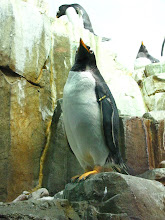Life on land is easily seen. Whether it's ants streaming across the kitchen floor, birds fluttering through the trees in a park, flowers blooming along the roadside, or any of the little things we see every day that reminds us of the life that surrounds us, we feel part of it as it flows around us. The oceans have just as much and more life than that on land, but it is for the most part hidden from us. Just as the need for water keeps a fish in the sea, our need for air keeps us above it. With technology, some venture far beneath the surface, but for most, the deep ocean is as alien as the surface of another planet.
This past summer, I was exploring the coast in Clam Harbour when I came upon part of the shell of a lobster and it took me by suprise. Don't get me wrong, I've been around the ocean a lot in my life, and I know that lobsters come from the ocean, but until that point I had never seen a lobster (or the remains of one) apart from the ones that came from a store and ended up on my plate. Seeing the remains lying on the rock as though something had just plucked it from the water (actually that's likely exactly what happened) made me realize that lobsters actually were in the water, whether I had seen one there for myself or not. An easy comparison to this is seeing roadkill. Everyone knows that deer, racoons, cyotes, skunks, etc. live abundently in our Canadian forests, and if one were to come across one in the wild, it probably wouldn't suprise them. However, if the only time you had ever seen a porcupine was as it ended up on your plate (yum!) your perception of our forests would likely be very different. It would be much harder to visualize the diversity of animals that exist around us. The oceans are just like this.
How can we bring ourselves closer to the wet world that surrounds us? How can we be able to sit on the shorline and picture all the creatures that are crawling and swimming beneath the surface, beneath that portal between our world and theirs? The solution may come be close to home. How do we most easily know of the animals on land? We take a drive. We examine the remains that wash up on the border between our world and the wild.
The next time you're at the beach, don't walk along the sand as though it's just the edge of our world, but examine the remains that are the fringeline of another. Perhaps it will change your perception of what it is that truly lies beneath the waters.
Friday, October 10, 2008
Wednesday, October 8, 2008
Sharks around Cocos Island
I came across this video through the PBS website. Complimenting the movie SharkWater, it focuses mainly on sharks with some information on the problems they face (aka. humans), while going into more depth about their feeding and mating patterns. The video has some great footage, and includes quite a bit on other fish species as well from Cocos Island, off the coast of Costa Rica.
http://www.pbs.org/wnet/nature/episodes/shark-mountain/video-full-episode/1403/
http://www.pbs.org/wnet/nature/episodes/shark-mountain/video-full-episode/1403/
Subscribe to:
Comments (Atom)
